|
7 Clarence Street / (7 Collage Approach 2016)
Greenwich
http://admiralhardygreenwich.co.uk/
https://whatpub.com/admiral-hardy
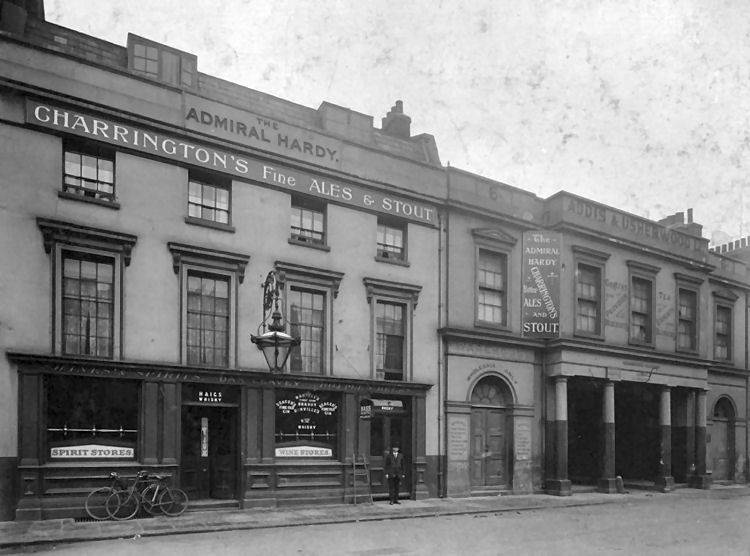
Above photo circa 1930. Showing Dan Leavey as licensee. |
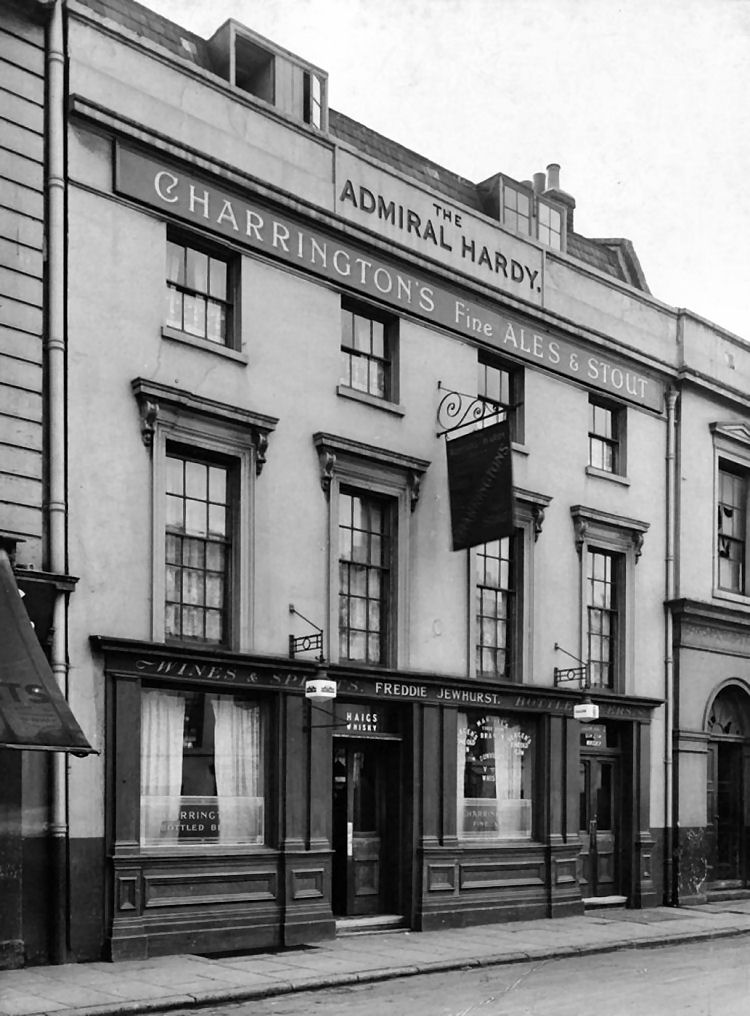
Above photo, circa 1936. |
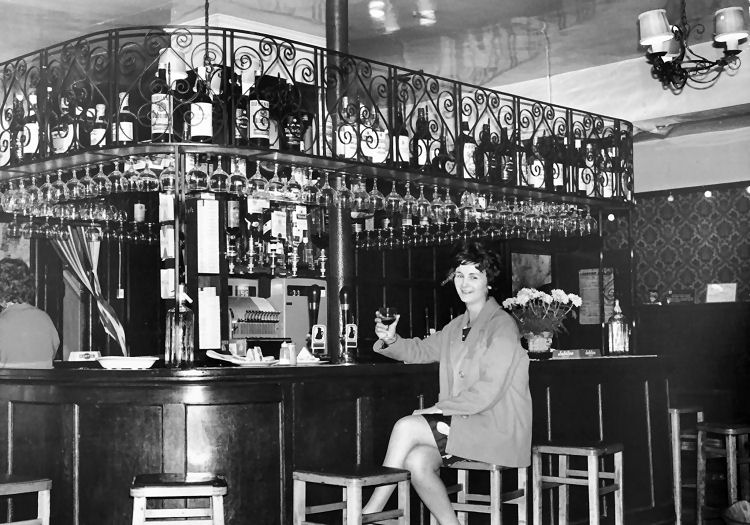
Above photo, circa 1970. |
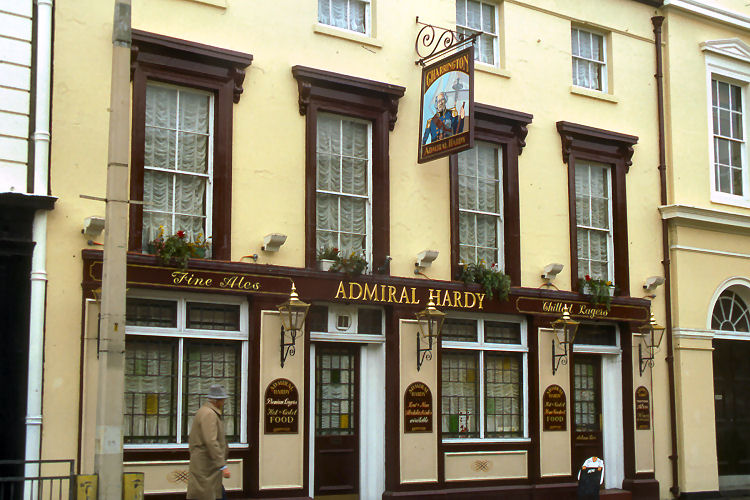
Above photo, 1989, by Challen Yee. |
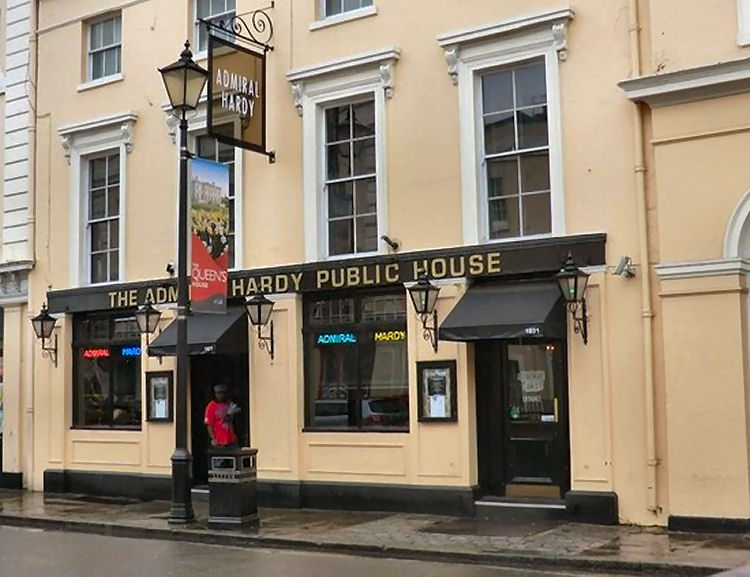
Above photo 2016. |
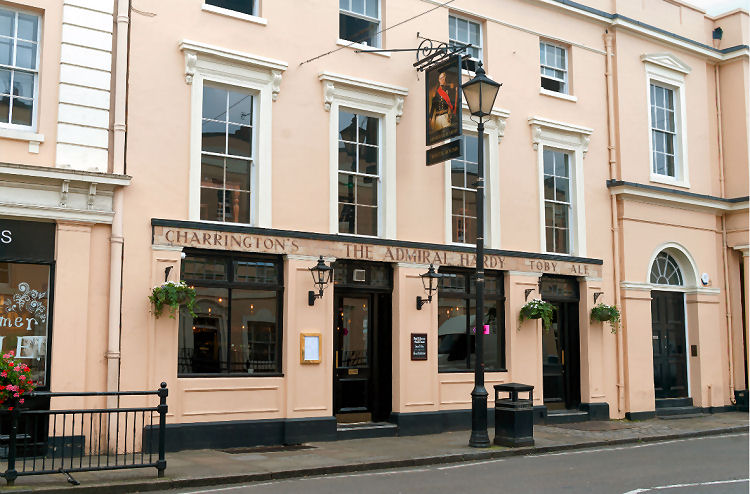
Above photo 2019. |
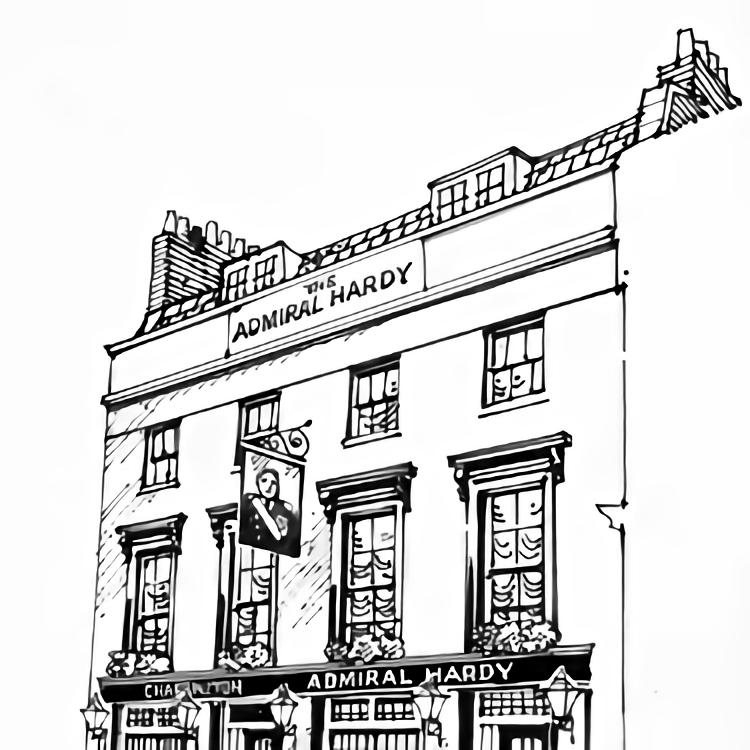
Above print, date unknown. |
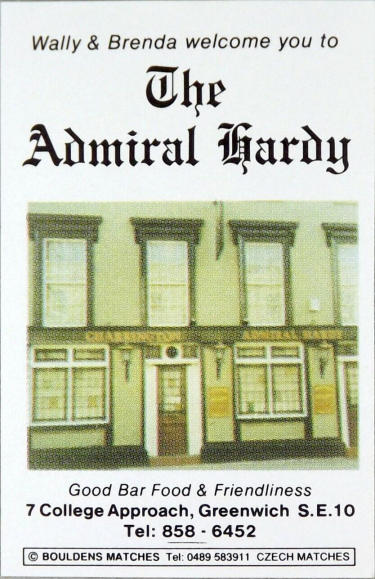
Above matchbox, 1982. |
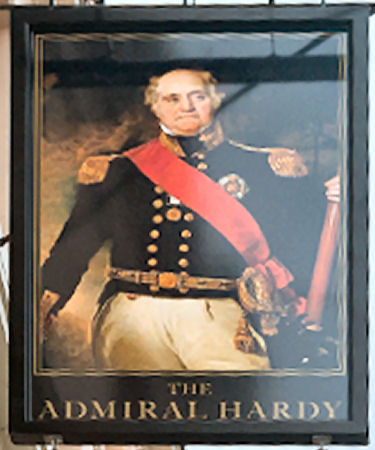
Above sign 2019. |
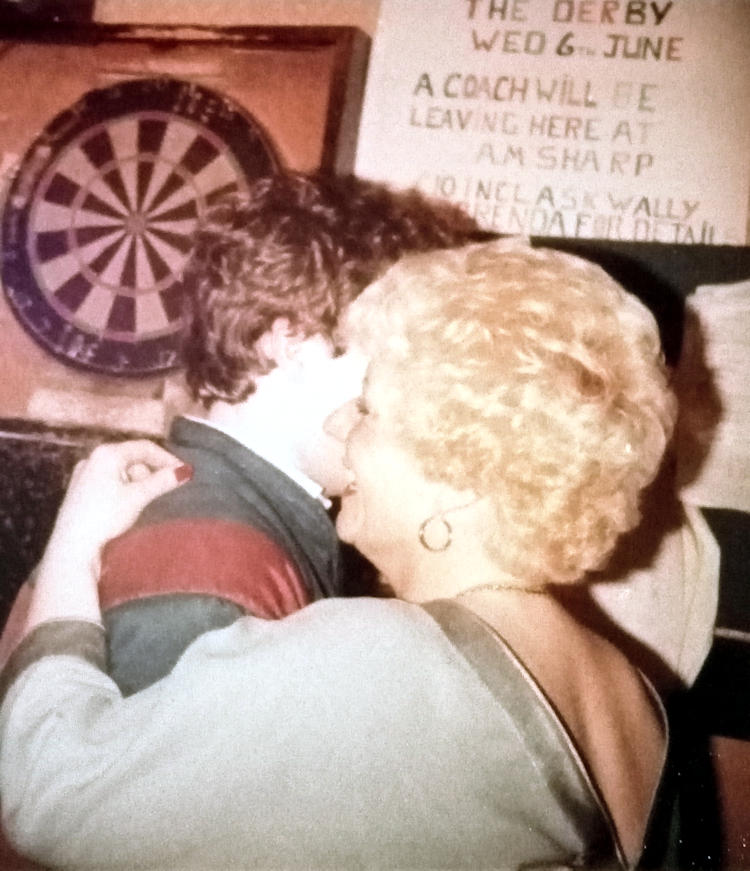
Above photo 1981, showing Brenda the landlady, dancing with Steve
Mortimore, kindly sent by Steve Mortimore. |
Identified as early as 1837 and has been a tied house of the Notting Hill
Brewery Co and also Charringtons. Not knowing the area I am not sure whether the pub addressed at 7
Clarence Street is the same as the one at 7 College Approach. I am hoping
they are and that for some reason the address changed. Local knowledge
required, thanks. In 1874, the "Admiral Hardy Music Hall" is addressed in Clarence
Street.
|
Kentish Mercury, Saturday 27 June 1846.
The annual dinner of the St. Ann's Schools took place on Thursday, 18th
inst., at Messrs, Mitchell's, the "Admiral Hardy Tavern,"
Clarence Street, Greenwich. Upwards of 250 children of the establishment
partook of the good cheer; which was provided for
them at the sole expense of a gentleman, a patron and liberal subscriber
to the school, who complimented Messrs. Mitchell on the
excellent arrangements made for the accommodation of so larger party.
|
|
From the Borough of Greenwich Free Press, 18 May, 1861.
On Tuesday last, an in inquest was held at the "Admiral Hardy," upon
the body of Hubert Davis a Greenwich Pensioner, who was run over by
a Woolwich cart, in the Trafalgar Road. The deceased was carrying a
number of ginger-beer bottles, and it is believed from being deaf,
did not hear the driver cry out. Verdict, accidental death.
|
|
Orr's Kentish Journal, 8 March 1862.
Hannah Baker, servant at the "Admiral Hardy," Greenwich, was charged
with staling a sheet, the property of Mr. Mitchell, landlord of the
"Admiral Hardy."
Remanded till Friday.
|
|
Windsor and Eton Express, Saturday 3 September 1870.
Suicide of the Crystal Palace Manager.
Mr. Carttar, Coroner for West Kent, held and enquiry on Friday afternoon
at the "Admiral Hardy Tavern," Greenwich, respecting the death of Mr.
Robert Bowley, aged 57, of Rock Hill, Sydenham, and for the past 14
years manager of the Crystal Palace company. We announced the fact of
Mr. Bowlers death last week.
Mr. Leach, solicitor, attended to watch the proceedings on behalf of the
Crystal Palace Company, Mr. Batt, of Dyers Hall, on behalf of the
relatives of the deceased, and Mr. E. Hughes, on behalf of the Woolwich
Steam Packet Company, from one of whose boats the deceased had jumped
into the river while in Blackwall-road. There were several officials of
the Crystal Palace present, and also of the Sacred Harmonic Society, of
which the deceased was secretary.
Mr. James Wilkinson, deputy manager to the Crystal Palace Company,
identified the body of the deceased, whom he last saw alive at his
residence at Rockhills, adjoining the Palace, on Wednesday afternoon.
The deceased had not been in good health for some weeks past, and was
under the treatment of Dr. Read. At 9:30 on Thursday morning, as witness
was going to his office at the Palace, he met a man who told him
deceased was somewhat better; and at 10:30, as deceased did not come to
the office, witness went to his residence, and was told by Mrs. Bowley
that he had left home in a cab to go to the office to get some papers
which he intended taken with him to Birmingham on Sunday. At 3 o'clock
in the afternoon, not having seen the deceased, who was very punctual in
his habits, witness made enquiry, and ascertained that he changed the
cab for an open fly, and have been conveyed to Penge, and thence to
Beckenham, where he left by the 11:13 a.m. train for London.
In answer to a juror, the witness said the deceased talked rationally,
but appeared in a despondent state, owing to ill health. Ruben Peskee,
master of the steamer Cores, belonging to the Woolwich Steam Packet
Company, said the deceased came on board on the up passage at 1:10 on
Thursday afternoon. When near Blackwall he was supplied with four
pennyworth of brandy by the steward. When the vessel was in the centre
of the river, between the Folly House and Cubitts-town Pier, witness
heard the wooden railing on the gangway on the port side opened, and the
deceased was in the water. The vessel was stopped at a distance of about
100 yards, and, three boats being at hand, the deceased was got into one
of them about eight minutes and a half, and the boat was towed by the
steamer up to Greenwich. The witness, in answer to the Coroner, said the
railing was in good order, and to remove it it required the hand to lift
it.
Mr. T. R. Cannon, licensed victualler, of Wapping, who came on board the
vessel at Blackwall, deposed to seeing the deceased walk to the spouson,
lift up the rail, which again fell into its place, and, with his walking
stick in his left hand, plunged into the river, clearing the
paddle-wheel by about two feet.
William Okes, Shoemaker, of Woolwich, and Police constable Lester, 309 R
Division, also passengers on board at the time, gave corroborative
evidence, the first witness stated that he called the masters attention
to the peculiar manner of deceased, and, suspecting that he intended to
drown himself, he kept an eye upon him for some time, but during a
momentary turning of the head the deceased left the vessel.
Inspected Goode, Thames Division, deposed to two boys in a boat reaching
the deceased, and keeping him from sinking until the arrival of the
police boat, and to taking him to the Dreadnought, at Greenwich
Hospital. Life was then extinct.
On searching the body a gold watch and guard, £10 10s. in gold and, 8s.
4d. in other money, were found, and also letters and other articles.
Dr. P. H. Leach, of the Seamen's Hospital, deposed that when he saw the
deceased life was extinct. He had no doubt whatever, that death
resulting from immersion in the water.
Dr. Read, of Guildford Place, Russell Square, said that deceased
consulted him about three months since, and from certain symptoms that
exhibited themselves, there had been a consultation between himself and
Dr. Tanner, and they agreed in the diagnosis of the case, that the
deceased was suffering from disease of the kidneys, known as Bright's
disease, with a weak, flabby heart. They thought that with a change to
sea air they would get deceased again round and better, that he had
strong objections to leave in the Palace, saying everything will go
wrong. It was, however, arranged that, accompanied by a friend - as he
was not in a fit state to go by himself - he should leave London for
Birmingham, and then to proceed to Scotland as the guest of the Duke of
Sutherland.
Two letters found on deceased were identified as in deceased's own
handwriting, and also one from Mr. E. T. Smith, who wrote to deceased,
expressing how glad he was to see him again in the chair at some
meeting; but telling him he feared he was working too much, and that he
would suffer a relapse. One of the letters in his handwriting referred to
the funeral of Mr. Harrison, President of the Sacred Harmonic Society,
in which he wrote. "I am unable, I think, even of attending our poor
president's funeral. I feel so weak, so ill, so worn out, I can do
nothing, and I know not who can be got to take care of things
(mentioning different individuals names). I am thoroughly unwell, and
cannot do more. It is so hard, as heart, hand, and energy are all gone."
The, Coroner briefly summed up, and the jury unanimous returned a
verdict, "That the deceased committed suicide while labouring under
temporary derangement." The deceased was formerly a resident at Eaton.
|
|
Kentish Mercury, Saturday 14 May 1881.
A child scalded to death.
On Saturday morning Mr. Carrtar held an inquest at the "Admiral Hardy,"
Clarence Street, Greenwich, on the body of Thomas
Fletcher, aged 11 months, of 28, Glenister Road, East Greenwich.
The evidence of the mother, Esther Fletcher was to the effect that on
Tuesday afternoon she was at tea and had poured out of cup
of tea, and placed it on the table, deceased being by the side of the
table, when he caught hold of the saucer and tipped that over
him, severely scored in his neck, chest, and face. She placed some oil
on the scalded parts, and then ran with him to the Seamen's
Hospital.
Mr. Rolston, house surgeon at the hospital, said every attention was
paid to the deceased after his admission, and he went on well,
but on Thursday morning at 1:30 he had a relapse, and died suddenly,
death being from shock to the system, produced by the
scalding.
The jury returned a verdict in accordance with the medical evidence, and
that the occurrence was accidental.
|
|
Kentish Mercury, Saturday 18 June 1881.
Fatal Accident on Deptford Bridge.
On Tuesday Mr. Carttar held an inquest at the "Admiral Hardy," Clarence
Street, Greenwich, on the body of William Glover, who died from injuries
received in an accident on Deptford Bridge.
Albert Thomas Glover, joiner, of 7, The Grove, Lewisham, identified the
body as that of his father, a carman to Mr. Powell, butcher, of
Lewisham. His age was 64, and he lived at witness's house. Last saw him
alive on Sunday week in the Seamen's Hospital, where he had been taken
in consequence of an accident on Deptford Bridge on the 30th of May.
When witness saw him in the hospital he was not rational, and although
he could speak had no idea what he was saying. On the day of the
accident deceased had been to Barclay and Perkins Brewery for a load of
grains.
George Lane, in the employ of Mr. Avery, butcher, Deptford Bridge, said
on the night of Monday the 30th of May, between 10:30 and 10:45, he was
looking up towards the Broadway, and saw deceased coming up the new
road, which had not been open for traffic. Someone called him to go
back, and he seemed to pull up, and afterwards touched up the horse, and
a horse and cart came down the embankment towards the old road, the cart
went over, the horse fell, and deceased pitched off the top of the
grains in the cart, and he was picked up from under the cart, and taken
into witness's employer's shop. It was a two-wheeled cart, and the bank
was about two feet high. The next day barriers were placed against the
embankment. Person's will usually stopped before they got so far on the
road. Believe the deceased said to the horse "Get over," and witness
thought it being dark, and deceased sitting up so high, he did not see
the embankment. The new road was then opened for tramway, but not
ordinary traffic. There were no other vehicles about at the time of the
accident. Believe there was a watchman at the Broadway end, but could
not say.
Sarah Jane Etherington, wife of a baker of 2, Deptford Bridge, said she
was standing at a shop door and saw a man come along with a green card
just after 11 at night, on the new road. Heard someone speak to him, and
he pulled the rein to come down into the lower road when they cart upset
and the man was thrown down. The accident occurred between her shop in
the butchers. Heard the man to say to the horse "Over you go," or words
to that effect. Did not think he could have known the depth of the road.
There was no red light where the accident happened, but there were red
lamps a little distance off, and a white light opposite. Only the
tram-cars for allowed on the new road, but if deceased had kept straight
on the accident would not have happened. Could not understand how he got
on the new road.
Henry Wood, carman, of Coldbath, said deceased got on the wrong road,
and two men at the corner of Church Street called to deceased, and one
said, "Mate, you're going the wrong road." Deceased said, "Am I? I'll
turn back again." As soon as he turned round the horse stopped on to the
bank, about 18 inches in height, and the horse, cart, and man went over
sideways. Deceased hit his head against the kerb, and then bounced
between the butcher's and bakers shop window, coming nearly on top of
witness. Deceased had been sitting on the front rail, driving. Witness
dragged him away from the grains, and a man took him into the butcher's
shop, and witness ran to the horse's head. Saw no watchman. It was very
dark at that spot, and there was no barrier.
John Kay, signalman for the Tramways Company on Deptford Bridge, said on
the night in question he was on duty there, and was in the signal box on
the new portion of the bridge. He saw a car coming along the line, and
knowing he had no right there he turned his red lights to Greenwich to
stop any cars coming that way. The man halted opposite the butcher's
shop, and witness jumped out of his box and ran down to meet him, and
when within 20 yards of the man, who was on the new line sitting on the
upside, he sang out to him, seeing he had turned his horse, "Hold hard,
you can't go there." The man said, "Alright, I'll chance it," whipped
the horse with the reins, the horse started, and the cart then went over
down the embankment, and the man's head apparently struck the kerb.
Heard no one call to the man previously. There were four posts driven
into the embankment, with signal lights on them, two between the signal
box and where the accident occurred. A man was stationed near opposite
the "Dover Castle" to turn the traffic on to the old road, and trams
only on the new line. There was another watchmen stationed near the Old
Clock House, and he saw him a minute after the accident. Deceased could
not have got on the new road without passing a watchman. The off wheel
first went down the bank. The place was well lighted.
John Williams, of 1, Garden Road, Tanner's Hill, the night watchman at
the time for the Tramway Company, at the corner of King Street and the
Broadway, said as deceased passed him he called to him, "Turn to the
right," but he took no notice, and as witness did not want to be run
over he stepped on one side and let the man go on. The horses trotting
as it passed witness. Heard two other men call to the deceased, and saw
the cart tip over. He could not follow the deceased as he had other cars
to look after, and some carts turned into Mill Lane.
Dr. Rolston, of the Seamen's Hospital, said deceased was admitted later
on the night of 30th of May, bleeding from scalp wounds and very much
collapsed. He progressed favourably until June 5th, when fever and
erysipelas set in, (bacterial skin infection) and he gradually sank and died on Saturday last. He
had been a hard drinker and hard worker, and his age was against him,
but the primary cause of death was the injuries. He was rational at
times, but witness did not hear him make any reference to the accident.
William Henry Payn, an inspector in the employ of the Tramways Company,
produced a plan of the accident, drawn shortly after the accident,
showing the check rail of about three inches which the cart went over.
There was a lamp about 10 yards from the spot where the deceased went
over.
The jury, after 20 minutes deliberation, returned a verdict that the
deceased died from erysipelas, brought on from injuries accidentally
received through being thrown off a cart on Deptford Bridge, during
improvements; but the jury consider that considerable neglect was shown
by the London Tramways Company in not providing additional means for the
safe conduct of the traffic. The deceased was at one time a prosperous
dairyman at Lewisham.
|
I am informed in March 2018 that the pub is currently closed and no one
knows why or for how long.
|
From the
https://www.newsshopper.co.uk By Pubspy, 17th January 2018.
Pubspy tries the Admiral Hardy in Greenwich.
We are told time and again not to judge a book by its cover, however
that is exactly what I did when choosing the Admiral Hardy in Greenwich
to be this week’s pub of choice.
From the outside, I saw what I thought would be a cosy and quiet pub in
College Approach, steeped in history and tradition.
I was, I admit, eager to get inside and settle down with a nice pint. I
was, predictably by this point, mistaken.
For, you see, the Admiral Hardy is not the traditional British public
house it appears to be to the wandering patron, it is in fact a ‘trendy’
bar.
Swap English ale for Bud Light, swap a cosy fire for a neon ‘Open Till’
2AM’ sign, and swap a comforting pie and mash pub classic for a ‘New
York Slice’.
The pub is small and littered with musical paraphernalia. Dotted all
over the walls are pictures of musical icons, from Jarvis Cocker to Mick
Jagger. The pub is unashamedly student friendly.
As a rule of thumb I would wager that if you don’t know what UCAS is,
you might feel out of place.
As I have mentioned – and not that I am hung up on this – I had a Bud
Light to drink, and tried to embrace my surroundings. The chairs were
all taken, and the bar was packed with leaning customers, so I wandered
aimlessly. I hope nobody thought I was dancing.
The pint was cheap, but as a student bar you would expect so. There were
a lot of bottled beers, but it was so busy I didn’t really have time to
browse.
One thing I would point out is how attentive the staff were. It was
packed, and they were working pretty bloody hard to keep everyone happy
- 99 per cent appeared to be, me being probably the only exception.
I think had I known going in that I would be spending the next hour or
so listening to Blur and being blinded by neon I could have prepared
myself. As it were, I was surprised by discovery of the Admiral Hardy
and I don’t think I could get over my disappointment at not being
settled down with a nice ale.
Staff: **** [Hard working]
Atmosphere: ** [Not my cup of tea, but can’t argue with the masses.]
Drinks: * [Bud light]
Price: **** [Student friendly]
Overall: ***
|
|
From the
https://www.newsshopper.co.uk 23rd January 2018.
Greenwich Hospital acquire the lease of two new buildings including a pub.
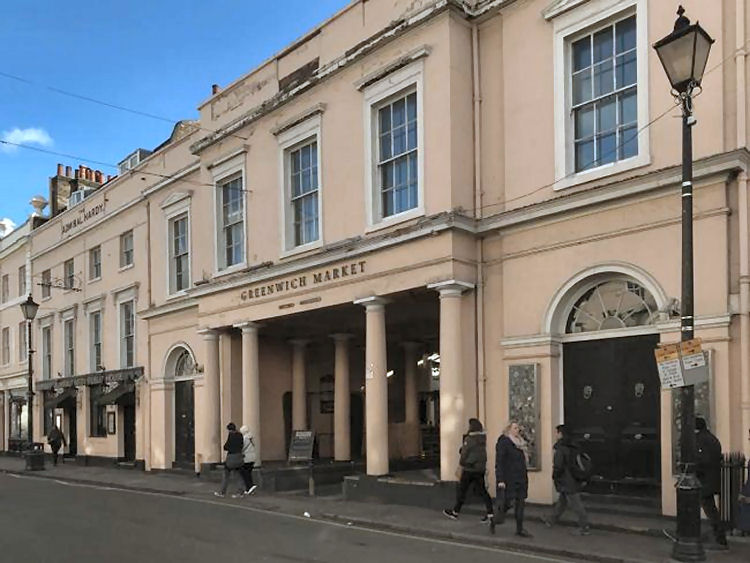
Clarence Hall, Greenwich. With Admiral Hardy on the left.
The lease on a popular Greenwich pub and Clarence Hall, which has
stood vacant for six years, have been handed back to the charity which
owns them.
Estate owner Greenwich Hospital has agreed terms with current operator
Hardy Inc to buy back the lease of The Admiral Hardy pub and Clarence
Hall, Greenwich.
Greenwich Hospital is a charity supporting serving and retired members
of the Royal Navy and the Royal Marines. They own a large part of the
town centre in Greenwich.
They are now looking for a new operator for both the Admiral Hardy and
the vacant Clarence Hall.
Gillie Bexson, property director Greenwich Hospital, said: "The Admiral
Hardy and Clarence Hall, both part of Joseph Kay's Greenwich Hospital
project, are the main gateway to Greenwich Market from College Approach.
"This is a very exciting opportunity for Greenwich Hospital and we will
be working closely with our advisers and the Greenwich community to
secure a new operator and look forward to bringing Clarence Hall back to
life.”
Frank Dowling, of Hardy Inc, added: "After 18 years in stewardship of
the Admiral Hardy, we felt it was a good time to hand over the baton.
"We will be focusing our efforts on The Trafalgar Tavern on Crane Street
and our ambitions to create a new hotel at the Trident Hall site next
door."
|
Greenwich Hospital, owner of the site, bought back the outstanding lease
on the premises in early 2018 and the pub subsequently closed. Re-opened
with operator Mosaic Pub & Dining on Friday 19th July 2019, A former Charrington's house, its past existence has been uncovered with the old
front fascia pub signage once again extolling this previous ownership.
|
"From an email received 1 April 2023"
This is part of the rebuild of central Greenwich by Greenwich
Hospital (i.e. the Royal Hospital for Seamen) undertaken from
1829/30 to 1843/4 under a general proposal made by its secretary and
(from 1829 on abolition of the Hospital Board) Civil Commissioner,
Edward Hawke Locker in November 1824.
It involved, shortly after that date, purchase by the Hospital of
the (by mid-1824) defunct Powis's Brewery that occupied much though
not all of the present covered market site, and replanning of the
exiting town-centre market block around it. That included the
creation of Nelson Street (now Nelson Road) to the south and
Clarence Street (now College Approach) to the north, both cutting
through previously built-over ground. The northern extension of King
Street (now King William Walk) was formed through the previous open
market-place on the east side and only Church Street to the west
retained its existing line, though its eastern frontage was totally
rebuilt.
The overall architectural plan was by Joseph Kay, the Hospital
Surveyor, but was done in parts as some plots were let on building
leases, rather than solely by the Hospital (at least, that was
Locker's original proposal). Much of the building design was also by
him, but not all, partly since following his tenure of the post,
though all agreed by the Hospital. The 1845 Hospital estate plan of
which I have an image is slightly unclear (from screen resolution)
as to the date of the 'Admiral Hardy': it looks like 1831 but is
more probably 1834 which was the year Hardy became Governor of the
Hospital. If he did not formally open it (and he may have done) he
would certainly have agreed the name and to best of my knowledge the
Mitchell family were the first lessees. This dating also fits with
the inner north-south market block immediately behind (though now
replaced) as 1833: I.e. the pub became the street end of it. The rest
of the frontage to east and west was only built in 1843.
Dr Pieter van der Merwe, MBE, DL. |
LICENSEE LIST
MITCHELL & SON
1840-41+ (both Henry age 55 & 30 in 1841 ) )
MITCHELL Henry Richard 1831-Nov/60 dec'd (age 47 in 1851 ) )
MITCHELL Louisa (widow) Nov/60-62+ (age 53 in 1861 ) )
LAUDER Robert 1866+
LANDER James to Aug/1869
KNIGHT Horatio James Aug/1869-71+ (age 38 in 1871 ) )
DEEKS Edward 1881-82+ (age 41 in 1881 ) )
LEWIS William 1891+
DEAR John 1891+ (age 51 in 1891 ) )
HARDY M A Mrs 1896+
SMITH Walter 1901-05+
DOUGHTY John A 1911+
LEAVEY Daniel 1919-34+
JEWHURST Frederick Harold 1938-44+
???? Wally & Brenda 1981-82
DOWLING Frank 2018+
https://pubwiki.co.uk/AdmiralHardy.shtml
 Census Census
|










